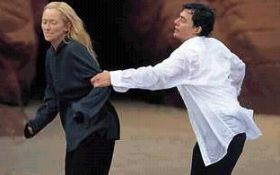
Alternate reality. Joyce and George (Swinton and McCamus) have an encounter in one of their lives.
scr John Mighton
with Tom McCamus, Tilda Swinton, Sean McCann, Rick Miller, Gabriel Gascon, Lynn Adams, Griffith Brewer, Daniel Brooks, Dean Hagopian, Eric Hoziel, Laurent Imbault, Jessica Pare
release UK 13.Jul.01
00/Canada 1h32

The premise is fascinating, and the way it plays out on screen looks astonishing, with very crisp camera work and clever transitions that almost make the film feel like one long, continuous flow of consciousness. There's water and glass everywhere, with gorgeous lighting and cinematography that's both soothing and austere. This gives the film a hypnotic, dreamy quality; it's both surreal and cerebral, challenging us to consider the possibilities. And yet the story and characters never remotely spring to life; it feels more like a experiment in existentialism than a movie. The acting is OK, but understated and odd, with only McCann and Miller emerging as real humans, perhaps because they're the only ones with a sense of humour. But the mystery plot just isn't strong enough to carry us through all the metaphysical stuff. And even though we can't predict the surprise ending, we don't really care anyway.
| themes, grisliness |

| 10.Jul.01 |
 R E A D E R R E V I E W S
R E A D E R R E V I E W S
Ric, Camarillo: "Lepage is to be congratulated on making a movie that will be loved by all cinema phonies because: (a) It is pretentious without being illuminating and so allows cinema phonies to pretend they understand it, unlike the common moviegoers they despise; (b) Clever cinematography and some interesting set-ups partially disguise the sheer emptiness of the enterprise; (c) It's claimed to be Lepage's first English-language film: to judge by the clunking construction, English is not - nor should it be - his first language; (d) Swinton has one of the least attractive personae on screen today which, added to her mannered acting, makes watching her about as enjoyable as having root canal work." (16.Jul.01)
Niall, St Andrews: "I regard Possible Worlds as one of the most exciting films (both visually and thematically), I have seen for some considerable time. Lepage's remarkable, theatrical, ability to make connections between apparently disparate objects serves his purpose tremendously well in this film, as he moulds one shot to fit the next, moulds one object into another, often with beautiful results. The performances are extremely good, well-directed (with a good deal of humour) and controlled. Swinton in particular holds terrific beauty on screen, and her ability to play several different versions of the character points up her ability as an actress, as well as Lepage's (and John Mighton's) desire to challenge the viewer, to go beyond dead film-making, which presents the audience with everything it needs to know and spoon-feeds us information that was already obvious. Instead, Lepage urges the viewer to use the imagination they have to make the same kind of connections as he does. It encourages real interaction with what is being seen on screen, dialogue which goes far beyond the often-patronising blockbuster. Just how much should we think about a film when we go and see it? How long will it stay in our memories afterwards? Of all the films I saw in 2001, the most extraordinary moment was that at the end of Possible Worlds - a scene on a beach, which had an amazing, ethereal cool to it. It had a calm, but also a great energy - for life, and all the many possibilites that exist within it to be explored. An enrapturing, enlivening and necessary work." (17.Feb.02)
Alain B, Quebec:  "From beginning to end, when the little light on the sea's horizon is turned off, i was completly immersed in that film! A really intimate look at the theory of multiple dimensions, through the eyes of a ordinary man, gifted with a fantastic conscience." (12.Mar.04)
"From beginning to end, when the little light on the sea's horizon is turned off, i was completly immersed in that film! A really intimate look at the theory of multiple dimensions, through the eyes of a ordinary man, gifted with a fantastic conscience." (12.Mar.04)